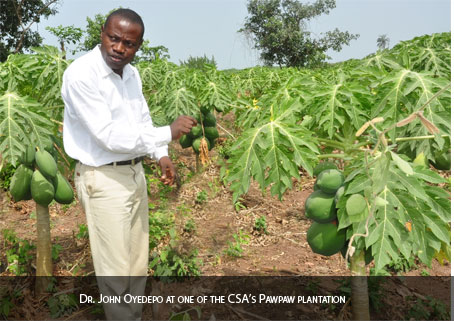
Nigerian farmers would soon start enjoying an agricultural system, which seeks to increase their productivity and protect the environment, called the Climate Smart Agriculture (CSA). According to a Research Fellow with the University’s Institute of Food Security, Environmental Resources and Agricultural Research (IFSERAR), Dr. John Oyedepo, the initiative would also bring about food security for all.
Dr. Oyedepo said the 2010 Declaration by the United Nations Food and Agricultural Organisation, which noted that “the rate at which the world is producing food and agricultural produce is not sustainable and unless food productivity is increased by 60 percent in the next few years, the world will be in problem”, culminated into the research on CSA. He said the practice involved studying the climate using technologies as the bulk of farmers in Africa were peasants that do not have access to information on agriculture. This fact, he said, had crippled their knowledge on when to start planting and when to stop planting due to the erratic pattern of rainfall and atmospheric temperature, stating that “farmers need to be armed with information in order to plan, know what to avoid during planting, what to plant and when not to plant”.
The Research Fellow said the project was highly Information Technology-intensive, and in order to make it work, it was able to win a grant from the Tertiary Education Trust Fund (TETFund), which IFSERAR utilised in the procurement of special data infrastructure such as a ground-receiving station that can download and process/analyse the information captured by helping to determine the surface temperature, African Forest Fire (which helps in locating the actual point where a fire is burning) and predict local precipitation by looking at the cloud temperature.
He said FUNAAB Radio would be used to create the necessary awareness in addition to the “Interactive Voice Response (IVR)” mechanism, whereby a farmer could call for an inquiry by speaking in his/her local dialect while the IVR would translate into English, processed and the farmer gets his/her response or feedback in his/her local dialect.
Dr. Oyedepo added that in order to make the project beneficial to rural farmers, they would be organised into “Climate Smart Villages”, which would allow them to have forest-land information of how to build resilience and adapt to the impact of climate change. Through this, the farmers would come together and have access to the viewing centres, where they would get the required information. While about five centres have been proposed across the country, the headquarters would be domiciled in FUNAAB. He said the sustainability of the viewing centres was already inculcated in the proposed budget that would come with either a demonstration plot or the adaptation pilot project. Differentiating between the traditional way of farming and the CSA, Dr. Oyedepo said the new approach would help to remove the ‘blind’ way of farming system in the sense that it involved working with information that would help to avoid disaster or loss, which was common to traditional farming.
He commended TETFund for its contributions toward the take-off of the project as well as the African Development Bank (AfDB), among other corporate supporters, saying “there are donors willing to invest into such ventures. Government can also make laws to mandate multinationals to open up farms to support project like this or ask them to devote certain percentage of their taxes to support agriculture. While we on our own will meet some of this private companies and tell them what we do. By doing all these, we would have opened up thousands of hectares of land and put in graduates that have no job to have something doing”.
